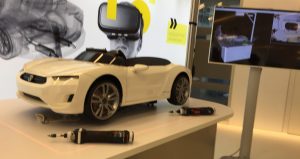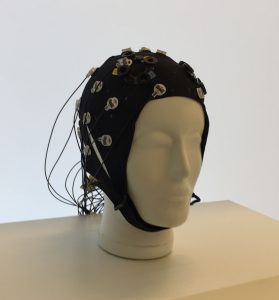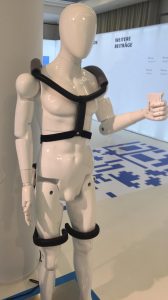by Tilman Ansorge
By digitization and artificial intelligence the working environment will change massively. Also societal and demographically processes as well as the development of the economy are essential factors of influence. The Frauenhofer world of experience “#Zukunftsarbeit” was an interactive exhibition of the Fraunhofer association introducing from 8. – 12. October 2018 in Berlin scenarios of the working world of the future. This experience demonstrates the chances and potential that comes with the new forms of working. All scenarios are based on the research of the Fraunhofer institutes. In parallel visitors were discussing this topic at a conference with experts.
The focus of the exhibition was on the areas of production and health care as they deemed these most important. Visitors were able to move interactively through future workplaces.
Future of Work in Production
In production and manufacturing the emphasis was on removing the human error factor. Intelligent assistance systems tell the user which tool to use, which area to go to and what to do.

Some of these application are already in use: tool tracking. A complex network of data points has to be tracked to provide real time guidance to a worker how to assemble a car. Certain aspects like the capturing of the users by camera would require anonymized data gathering to comply with worker union requiremements.
For interaction with complex robots and machines the application of this guidance became quickly evident. A worker merely requires to follow onscreen (or AR / VR) instructions to complete tasks. This potentially opens the job requirement to a broader field.

Another application measures brain waves to determine the level of happiness. This still seems difficult enough to collect – an early prototype was shown. From a company point of view valuable to know the mood of their employees. Felt worrying that an employer would have this kind of data. Here again regulations play an important role to use the data for general improvement and not against individuals.
Creating networks of shared data for usage is still one of the major challenges in Germany mainly from a regulatory less from a technology point of view.
Future of Work in Health Care
Availability and accessibility of data is even more a major challenge within health care. Here the sensor data would allow health care specialistst to have real time data on the health status of their patients and can act immediately or even prior to a problem occurring.
Very impressive was the “organ on a chip”, where a pharmacist can determine the exact dosage of a medicine on the live tissue samples of a specific patient. The resulting medication is tailored to the patient. This way a more effective treatment is possible with less side effects.

CareJack was another interesting prototype. Aimed at health care personnel,the exo-skeleton with sensors measures blood pressure and weight lifting capacity, indicating when a limit is reached or what movement to improve to avoid damage to the own health of the care person.
